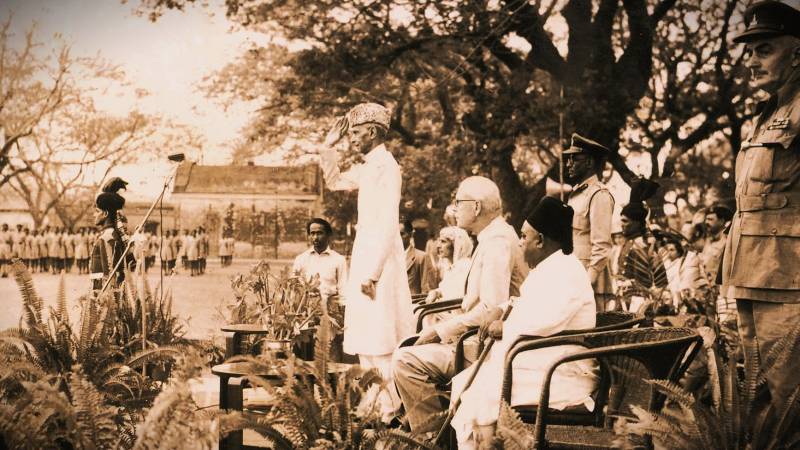
Much has been written about the commemoration of Mr Jinnah's death anniversary in Bangladesh on September 11 this year. Mr Jinnah was the subcontinent's maha purush (great being), and sooner or later, I have always believed - as a biographer of the man and his admirer, that he would be recognised throughout the subcontinent for his many contributions, not just to Pakistan and Bangladesh, but to India itself, where his contributions have been downplayed by successive Indian nationalist governments who want to view him solely responsible for the partition of India in 1947.
Recall that Mr Jinnah was the only politician to be called the best ambassador of Hindu-Muslim unity. His contributions to progressive causes as an Indian nationalist politician were second to none, and his imprint on the laws of all three nations is indelible. He came to the idea of Pakistan very late in the day and, even afterwards, was open to the idea of an autonomous region within a federated union of India. Mr Jinnah, the uniter and bridge builder, deserves to be honoured, but nationalist mythologies in India and Pakistan have pigeonholed him into the category of an uncompromising Muslim separatist, which he was not. These nationalist mythologies, narrowminded ideologies and ahistorical angle of vision need to be struck down.
If our Bangladeshi friends are serious about honouring Mr Jinnah's legacy, I caution them not to do what Pakistan has done. Pakistan must remain a cautionary tale for Bangladesh as what it should never do. The Islamic Republic of Pakistan might have his picture in every official building and on its currency notes, but make no mistake about it, Pakistan today is an antithesis of everything that Mr Jinnah stood for in his long political career. Mr Jinnah stood for a Muslim-majority state that was progressive and unabashedly secular. His Islam, ontologically emptied as it was, was of a modernist variety that he felt – rightly or wrongly- was compatible with the post-enlightenment idea of secular democracy. Pakistan remained an inclusive and relatively secular state so long as East Pakistan was in the equation.
Bangladesh's departure in 1971 transformed Pakistan ideologically from what was a Muslim homeland into an Islamist theocratic state that buried Jinnah's inclusive and secular vision for the country. If Bangladesh wants to honour Jinnah, it must stay true to its indigenous secularism. It must be remembered that Mr Jinnah made his famous August 11 speech, where he promised a secular Pakistan, in response to a question posed by Kiran Shankar Roy of East Pakistan. Mr Jinnah's law minister was a scheduled caste Hindu, Jogindranath Mandal, also from East Pakistan. His foreign minister, Zafrullah Khan, was an Ahmadi, and on the issue of Ahmadis, Mr Jinnah was resolute. He refused to allow resolutions asking for their expulsion from the Muslim League. Islamists in Pakistan prevailed over that vision in 1974, and the state got into the business of defining what a Muslim is. Bangladesh must never allow this to happen and must never become an Islamic Republic. Bangladesh, instead, should remain true to Jinnah's vision of a secular albeit a Muslim-majority state. It must celebrate its religious diversity and protect its minorities by ensuring complete freedom of religion. To do this, Bangladesh must not pay heed to the Jamaat-e-Islami and other such motley crew of Islamist adventurers. Jamaat-e-Islami historically was opposed to the creation of Pakistan, holding the very idea in contempt with Maulana Maududi describing Pakistan as akin to a chaste prostitute. To quote Eqbal Ahmad, the Muslim nationalism that created Pakistan grew on the premises of modernism and reform. Therefore, it was resisted by the religious divines. The modernist view of the causes of Muslim decline and of the remedies it required, especially as articulated by Sir Syed Ahmed Khan and his ideological successors, including Iqbal, had seeped into the consciousness of the Muslim intelligentsia and it is this idea that needs to be preserved by Bangladesh.
If Bangladesh can remain an inclusive, secular democratic state, it would be fulfilling Pakistan's true mission i.e., a state that can allow Muslims of South Asia to show to the world that an ontologically emptied and secularised Islam for the modern age can deliver Muslims from their morass and help usher in an intellectual renaissance for the entire Muslim world. By staying true to its indigenous secularism and safeguarding the rights of all its citizens—Muslim and non-Muslim alike—Bangladesh can not only honour Mr Jinnah but also demonstrate how a modern, pluralistic Muslim-majority state can succeed in the 21st century. In doing so, Bangladesh has the potential to fulfil a mission that the founders of Pakistan had envisioned, i.e. the practical demonstration that Islam, when emptied of dogma and aligned with secular governance, can lead to a renaissance that elevates its followers and showcases their contributions to the world.
Bangladesh's success as an inclusive and secular democratic state would not only be a tribute to Mr Jinnah, but also a fulfilment of the true promise of the idea of Pakistan—a homeland for Muslims that is progressive, peaceful, and tolerant. By embracing and protecting its religious diversity, Bangladesh can show the world that a modern, enlightened Muslim-majority state is not only possible but also essential for the future of the Muslim world. This is how Bangladesh can truly honour Mr Jinnah's legacy and, in doing so, pave the way for a brighter, more inclusive future for South Asia and beyond.

